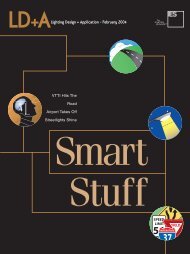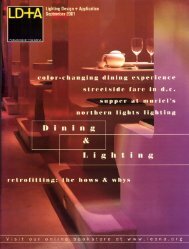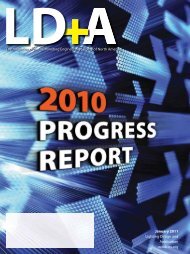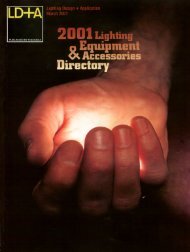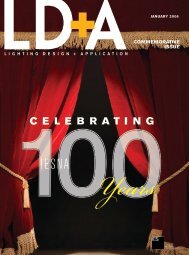Research matters - Illuminating Engineering Society
Research matters - Illuminating Engineering Society
Research matters - Illuminating Engineering Society
You also want an ePaper? Increase the reach of your titles
YUMPU automatically turns print PDFs into web optimized ePapers that Google loves.
image created in AGI32<br />
AGI32<br />
Version 1.7<br />
Ray Tracing, Surface<br />
Specularity, Tunnel<br />
Luminance, Enhanced<br />
Daylighting, Daylight<br />
Factor, CIE General Sky<br />
Models, Unified Glare<br />
Rating (UGR), Import 3D<br />
ACIS Entities, Advanced<br />
Surface Editing, Save<br />
Custom Schedules,<br />
Drag-n-Drop IES Files,<br />
Self-Emitting Sources<br />
(Neon), Adjust Color<br />
Bleed, Improved<br />
Photometric Instabase<br />
and more.<br />
User driven.<br />
lighting software<br />
www.agi32.com<br />
Circle 35 on Reader Service Card.<br />
CAREERS & HIRING<br />
• A recruiter knows the “players.” A<br />
recruiter specializing in your industry<br />
will know “where the bodies are<br />
buried.” You may know or hear of<br />
candidates who are out of work, or<br />
are known to be “on the outs” with<br />
their current employers, but a good<br />
search firm with great contacts, and<br />
good knowledge about the lighting<br />
and electrical industry will know<br />
which candidates to contact who<br />
may not be known to be open or<br />
available. Like a combination of a<br />
detective and a matchmaker, the<br />
recruiter, through an often-exhaustive<br />
process, will determine a group<br />
of candidates from whom you can<br />
choose. And, most importantly,<br />
unlike job board candidates, where<br />
you find the best candidates available<br />
for your position, your search<br />
firm will show you the best candidates<br />
qualified for your position.<br />
• A recruiter can more easily contact<br />
a variety of candidates whom you may<br />
not feel comfortable going after. For<br />
example, a recruiting firm, because<br />
it’s a “third party,” can easily and discreetly<br />
contact candidates working<br />
for some of your direct competitors.<br />
If your firm contacts your<br />
direct competitor, it is more likely<br />
to leak out. Plus, we have heard<br />
stories of one company recruiting<br />
directly from a competitor, which<br />
causes the competitor to do the<br />
same thing in retaliation, causing an<br />
exodus of people back and forth.<br />
• Because it’s a third party, a recruiting<br />
firm can probe into issues a candidate<br />
may have along the way—issues he<br />
may not share with you, his prospective<br />
employer. And if a candidate has a<br />
concern(s), wouldn’t you rather<br />
hear about them early on when you<br />
have a chance to counter or overcome<br />
those concerns, rather after<br />
the candidate has turned down<br />
your position?<br />
• A search firm can expedite salary<br />
negotiations. The recruiter can help<br />
by working with both parties right<br />
after the first interview, getting a<br />
sense of the salary parameters as<br />
well as candidate expectations.And,<br />
no, this doesn’t mean that the<br />
recruiter will try and get the maximum<br />
amount of dollars for the candidate,<br />
thus increasing his/her fee.<br />
Your search firm won’t talk with<br />
you to make sure the offer you<br />
might extend is appropriate, but it<br />
will work with a candidate to make<br />
sure her salary expectations are<br />
realistic. We find if candidate and<br />
company really want each other,<br />
dollars rarely get in the way (provided<br />
that the necessary “due diligence”<br />
is done by your recruiter to<br />
make sure candidate expectations<br />
are within your salary range).<br />
• A good recruiting firm will prepare a<br />
candidate before she or he gives notice,<br />
and follow up with the candidate (and<br />
you) during the critical period between<br />
offer acceptance and start date. Your<br />
recruiter should also caution your<br />
employee-to-be (before or at least<br />
at the time they accept your offer)<br />
on the dangers and pitfalls of entertaining<br />
a counter offer. (See<br />
“Careers & Hiring” LD+A October<br />
2003).<br />
• A recruiter will follow-up after the<br />
hire. Not unlike a marriage, the first<br />
few weeks (and sometimes<br />
months) are an adjustment period<br />
for both parties—again, it is a new<br />
relationship.And having an intermediary<br />
to whom you can discreetly<br />
share any minor concerns gives<br />
both those parties a chance to<br />
more smoothly and easily resolve<br />
issues as they continue to cement<br />
their own relationship. Plus, we find<br />
a new employee still loves to hear<br />
(third-person) feedback on how<br />
he/she is doing with his/her new<br />
job, so giving that feedback to your<br />
recruiter can be very beneficial.<br />
Have a question about hiring, interviewing,<br />
performance evaluations, the<br />
job market? We’ll select some of the<br />
best questions to answer in our next<br />
column in August LD+A. Send your<br />
question to paul@pompeo.com. Your<br />
name and company will not be used.<br />
Paul Pompeo is principal with the<br />
Pompeo Group, Albuquerque, NM, a<br />
leading executive recruiting firm in the<br />
lighting and electrical industry. Pompeo<br />
had spent 16 years with Search West<br />
Inc. before starting his own firm in<br />
March 2003. He can be reached at<br />
paul@pompeo.com or www.<br />
pompeo.com.<br />
. . . . . . . . . . . . . . . . . . . . . . . . . . . . . . . . . .




